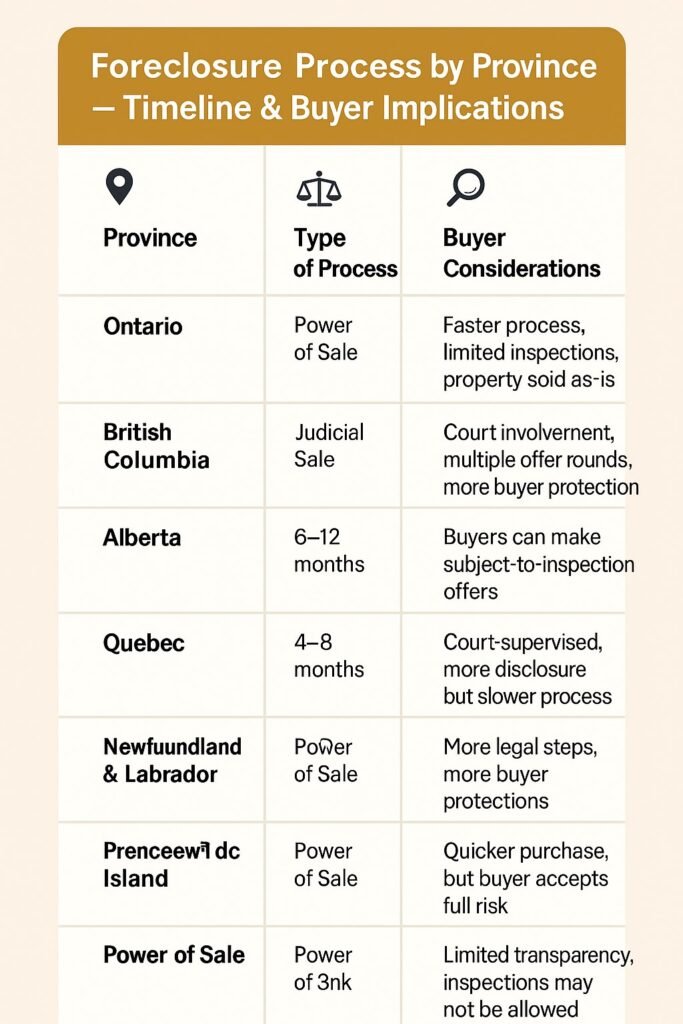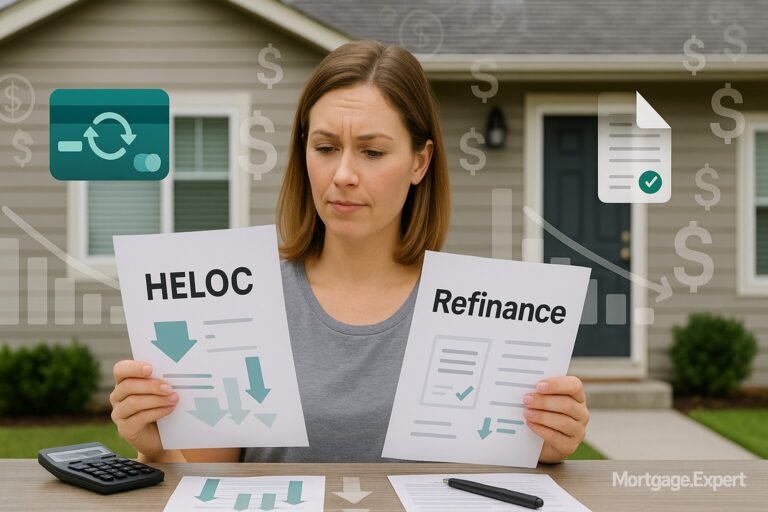
Should You Buy a Foreclosed Home in Canada? Here’s What You Need to Know
Foreclosed homes in Canada can be a great deal — but they come with risks. Learn what to expect, how the process works, and whether buying a foreclosure is the right move for you in 2025.
Thinking about buying a home at a lower price? You’ve probably come across the idea of purchasing a foreclosed property. In a hot housing market where prices are sky-high and bidding wars are common, foreclosures might feel like a golden ticket. But as with most “deals,” there’s a catch—or a few.
Foreclosed homes can offer excellent value, but they come with a level of risk, uncertainty, and legwork that most first-time buyers aren’t always prepared for. This article walks you through the real pros and cons of buying a foreclosure in Canada, how the process works in different provinces, and how to approach it smartly—without falling into a costly trap.
What Exactly Is a Foreclosure?
A foreclosure happens when a homeowner can no longer keep up with mortgage payments. Eventually, the lender steps in to repossess and sell the property to recover the outstanding debt. In Canada, there are two primary foreclosure processes depending on where the home is located:
- Judicial Sale: Common in provinces like British Columbia, Alberta, Saskatchewan, Quebec, and Nova Scotia. The lender must go through the courts before selling the property. This process can take months, sometimes over a year.
- Power of Sale: Seen in Ontario, New Brunswick, Newfoundland, and P.E.I. This is a faster route where the lender can sell the home without court involvement.
So if you’re eyeing a property in Ontario, expect things to move much faster than in BC or Quebec.
How to Find Foreclosed Homes in Canada
Foreclosed listings aren’t as easy to find in Canada as they are in the U.S., where foreclosure auctions are more public. In Canada, your best bet is to:
- Talk to a local real estate agent experienced with distressed properties.
- Browse real estate platforms like Realtor.ca or OJO that occasionally include foreclosure listings.
- Contact lenders, credit unions, or banks directly. Some have internal foreclosure sales not always advertised publicly.
Also, with rising interest rates and inflation pressures, foreclosures in Canada may increase, so staying informed through local market updates helps.
The Benefits of Buying a Foreclosed Home
Buying a foreclosure isn’t just about getting a deal—it’s about seeing potential where others see problems. Here’s what’s attractive about these properties:
You might pay less than market value. Since lenders want to recover their money quickly, they often list homes at a discount.
Room for renovation and ROI. Most foreclosed homes need some TLC. But if you’re willing to renovate, you could flip the property or rent it out for profit.
Outstanding taxes or liens are often cleared. Lenders usually handle the legal cleanup, making the purchase less risky than it looks.
Stronger negotiating power. If a home has been on the market for months, there may be more flexibility on price—especially if it’s going through a judicial sale.
Flexible mortgage options. If your credit and income are solid, you might qualify for standard or even preferred rates with select lenders—even for a foreclosure.
📉 How Buying a Foreclosure Can Save You Thousands
Here’s where foreclosure buyers often come out ahead:
Lenders often price foreclosures lower than market value to sell quickly, creating instant equity potential.
With the right upgrades, a foreclosed home can gain significant value, especially in hot neighbourhoods.
In many cases, lenders wipe out unpaid taxes and legal claims to simplify the transaction.
If a property’s been sitting on the market, motivated lenders may be open to offers below list price.
Investors can buy low, renovate smartly, and rent or resell at a premium in growing communities.
The Hidden Risks of Foreclosed Homes
While the deal may look good on the surface, what’s hiding underneath could hurt your wallet—and your peace of mind.
The sale is “as-is.” That means no guarantees, no repairs, and often no inspection rights before the sale is final.
There could be serious damage. Former owners may not have had the means (or motivation) to maintain the home—think leaks, mold, outdated wiring, or pest issues.
You might face legal or occupancy complications. Some homes may still be occupied or have unresolved disputes tied to them.
Financing can be tricky. Many lenders require a home to be in “livable” condition before approving a mortgage. If the home is too damaged, your only option might be private lending or a purchase plus improvements mortgage.
The emotional toll. Between tight timelines, legal red tape, and bidding wars with investors, buying a foreclosure can be stressful—even for seasoned buyers.
⚠️ Top Risks to Watch Out for in a Foreclosure Home
Buying a foreclosed home might be a great deal—but be aware of these potential pitfalls:
No guarantees, no repairs—you’re responsible for any damage, visible or hidden.
Many foreclosures don’t allow full inspections before purchase, making it hard to budget for repairs.
From pest issues to foundational damage, unforeseen repairs can quickly eat into your savings.
Some homes may have title issues, unresolved liens, or even occupants still living inside.
Court timelines, competitive bidding, and red tape can make buying a foreclosure mentally exhausting.
What You Need to Know Before Making an Offer
Before jumping into a foreclosure deal, take a step back and check:
- Your total budget: Include closing costs, legal fees, back taxes (if any), and renovation estimates. Don’t assume the sticker price is your final cost.
- Your province’s legal process: Buying in Ontario? The process may be fast but competitive. In BC or Alberta? Prepare for court delays and more paperwork.
- Your mortgage eligibility: Not every lender is comfortable financing foreclosed homes. Talk to a mortgage broker about your options early on.
- Legal support is essential: You’ll need a real estate lawyer familiar with foreclosure sales to protect your interests and catch hidden liabilities.

How to Start the Foreclosure Buying Process
Here’s how to do it right:
- Get pre-approved so you know how much you can afford—even if the property needs work.
- Work with an experienced real estate agent who knows how to navigate foreclosure listings.
- Research the property—look into its title, history, and condition (if accessible).
- Hire a lawyer early to review the foreclosure sale terms.
- Plan for renovation or repair costs up front. Use a home inspector if access is allowed; if not, ask neighbours and use visible cues to estimate condition.
- Act fast but don’t skip due diligence—others are watching foreclosure listings too.
Frequently Asked Questions
Why are foreclosed homes cheaper?
Because lenders want to recover funds quickly and usually sell properties “as-is,” making them less appealing to average buyers.
Can I get a mortgage on a foreclosure home?
Yes, but it depends on the condition of the home. Some lenders won’t finance homes that are uninhabitable. You may need a construction or renovation mortgage.
Are foreclosure auctions common in Canada?
Not as much as in the U.S. Most foreclosures here are handled privately through agents or court-ordered listings.
Is a short sale better than a foreclosure?
It depends. In a short sale, the bank agrees to sell the home for less than what’s owed. But foreclosures often sell at even lower prices. Banks prefer whichever method gets them the most recovery.
Final Verdict: Is Buying a Foreclosed Home Worth It?
If you’re a risk-tolerant buyer with renovation experience, legal support, and access to good financing, buying a foreclosed home in Canada can be a smart way to get into the market or invest in a valuable asset.
But for first-time buyers or those seeking a smooth, turnkey purchase, it might feel like biting off more than you can chew.
If you’re unsure, talk to a mortgage expert and real estate lawyer before making any commitments.
⚠️ Thinking About Buying a Foreclosed Home?
Foreclosures can offer great value — but also hidden risks. Our mortgage experts will help you understand the financing rules, legal steps, and inspection must-knows before you buy.
🏠 Get Foreclosure Advice NowStuck with a Mortgage Decision?
Don’t stress — our team is here to help. Reach out for free, no-obligation guidance.
Contact the Experts



